The Olive Branch
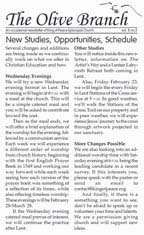
The latest issue of our newsletter The Olive Branch is now online and will go into the mail tomorrow. You may view the newsletter in Adobe PDF format now here: http://kingofpeace.org/vol8no2.pdf
Irenic. The word means peaceful. This web log (or blog) exists to create an ongoing, and hopefully peaceful, series of comments on the life of King of Peace Episcopal Church. This is not a closed community. You are highly encouraged to comment on any post or to send your own posts.


While you may not have heard the terms "The Emerging Church" and "Emergent Churches" before, these are two ways of describing a new way to be a church that are getting a lot of press. Some folks come and peak at our website and see us as part of this movement which arose largely among evangelical churches disatisfied with some things about that Christian movement. Yet while we are not intentionally, self-awarely so, there are some points of connection to be sure.
A recent article in Christianity Today Five Streams of the Emerging Church will fill you in on the details. The author of that article notes five themes found in emerging churches as:
Clearly King of Peace does not reflect all of these themes, but I think our way of being the Body of Christ in Camden County is not unrelated to the Emerging Church. There is also a line in the article which I think does reflect King of Peace. It says,
Emerging upholds faith seeking understanding,
and trust preceding the apprehension
or comprehension of gospel truths.
I had to read that a couple of times to get it. Faith seeking understanding I know as a medieval quote from a time when faithful Christians came to realize they could use their God given reason to probe more and deepend their understanding. And then the part about reaching out in love and establishing trust with people before they have come to faith is also something we strive for even if we may miss sometimes. If I understand the above correctly, I think it is a fair description of our congregation even though we don't hit all five of the streams noted above.
So what is probably most true is that King of Peace is not an emerging church or part of the Emergent movement, but in our own way we reflect some of what those post-evangelical churches are up to.
peace,
Frank+
The Rev. Frank Logue, Pastor
At 1/31/2007 10:48 AM, said…
At 1/31/2007 3:04 PM, said…
At 1/31/2007 9:26 PM, The Bosom Serpent said…


At 1/29/2007 8:57 AM, anything but typical said…
At 1/29/2007 1:07 PM, said…
At 1/29/2007 4:40 PM, The Bosom Serpent said…
I run into a similar problem many times in my owm writing when two words seem appropriate but neither fully conveys what I am trying to say. I eventually gave up and resorted to putting a forward slash between the words and including them both. I believe it enriches the writing by multiplying potential meaning/interpretation.
Resentment and gratitude cannot coexist, since resentment blocks the perception and experience of life as a gift. My resentment tells me that I don't receive what I deserve. It always manifests itself as envy. Gratitude, however, goes beyond the "mine" and "thine" and claims the truth that all life is a pure gift.
Labels: Henri Nouwen, quotes
At 10/13/2010 4:08 PM, said…
Believe it or not, gratitude comes from well-resolved resentment. You see, babies are not "born" with gratitude. They scream, they cry, they want to be fed, period, by WHOEVER is there, as long as they get what they want. Some people, sadly, remain like that for the rest of their lives, even into the nursing homes...while other people apparently "grow up" and realize, that, no, wait, life is a gift, I AM AN ACTIVE PARTICIPANT, therefore I can take care of myself and others. Those that have envy in their hearts(I did!)think of life as a "burden" to be carried, something "imposed" on them... grow up already!
Things were fine in Nazareth until Jesus opened his mouth and all hell broke lose. And this was only his first sermon! One might have thought that Jesus would have used a more effective rhetorical strategy, would have saved inflammatory speech until he had taken the time to build trust, to win people’s affection, to contextualize his message—as we are urged to do in homiletics classes.Preaching grace nearly got Jesus killed that day in Nazareth and did get him later killed in Jerusalem. Preaching God's love for people different from himself got that preacher punished in South Carolina. We want to control who God can love and how. But God never cooperates by hating who we want Him to hate.No, instead he threw the book at them, hit them right between the eyes with Isaiah, and jabbed them with First Kings, right to the jaw, left hook. Beaten, but not bowed, the congregation struggled to its feet, regrouped and attempted to throw the preacher off a cliff. And Jesus "went on his way."
And what a way to go. In just a few weeks, this sermon will end, not in Nazareth but at Golgotha. For now, Jesus has given us the slip. Having preached the sovereign grace of God—grace for a Syrian army officer or a poor pagan woman at Zarephath—Jesus demonstrates that he is free even from the community that professes to be people of the Book. The Book and its preachers are the hope of the community of faith, not its pets or possessions....
In a seminar for preachers that I led with Stanley Hauerwas, one pastor said, in a plaintive voice, "The bishop sent me to a little town in South Carolina. I preached one Sunday on the challenge of racial justice. In two months my people were so angry that the bishop moved me. At the next church, I was determined for things to go better. Didn’t preach about race. But we had an incident in town, and I felt forced to speak.
"The board met that week and voted unanimously for us to be moved. My wife was insulted at the supermarket. My children were beaten upon the school ground."
My pastoral heart went out to this dear, suffering brother. Hauerwas replied, "And your point is what? We work for the living God, not a false, dead god! Did somebody tell you it would be easy?"
At 1/27/2007 10:36 AM, anything but typical said…
 Over at On Faith, the folks at Newsweek and The Washington Post are offering comments by a variety of panelists on whether presidential candidates should talk about their religious convictions. For example, Croatian theologian Miroslav Volf writes,
Over at On Faith, the folks at Newsweek and The Washington Post are offering comments by a variety of panelists on whether presidential candidates should talk about their religious convictions. For example, Croatian theologian Miroslav Volf writes, And social justice champion Jim Wallis writes,The candidates for the highest office, just as all other citizens of liberal democracies, have the right to express their religious views in public....
'But more is at stake than just exercise of the candidates’ rights. It would seem disingenuous if presidential candidates did not express their religious views. If the candidates are religious, presumably their religious convictions touch the very core of who they are and shape significantly their social vision. More broadly, religious motivations are then what largely makes them “tick.” Not to know their religious views is not to know them.
I have said and written many times that I think a good and fair discussion of how a candidate’s faith shapes his or her political values should be viewed as an appropriate and positive thing—it’s as relevant as any other fact about a politician’s background, convictions, and experience for public office....We do as a nation have a separation of church and state which means that there is no official religion or religious view.
Having said that, I also say that it is important to remember that the particular religiosity of a candidate, or how devout they might be, is much less important than how their religious and/or moral commitments shape their values, their political vision and their policy commitments. If one’s religious and ethical convictions don’t shape a candidate’s (or a citizen’s) public life—what kind of commitments are they?
 However, we do not have nor would I want us to have a separation of faith and politics, meaning that I expect someone's faith and values will effect the political decisions they make. As these views will effect their decision making, I don't mind candidates describing the ways in which they feel their own faith will effect their public service. But I find that much political rhetoric is different in kind from what I am describing and can degenerate to someone who seems to have no outward signs of faith other than during political campaigns trying to wrap him or herself in the Bible. Don't they realize that America is not the Kingdom of God and Jesus is neither Democrat nor Republican?
However, we do not have nor would I want us to have a separation of faith and politics, meaning that I expect someone's faith and values will effect the political decisions they make. As these views will effect their decision making, I don't mind candidates describing the ways in which they feel their own faith will effect their public service. But I find that much political rhetoric is different in kind from what I am describing and can degenerate to someone who seems to have no outward signs of faith other than during political campaigns trying to wrap him or herself in the Bible. Don't they realize that America is not the Kingdom of God and Jesus is neither Democrat nor Republican?At 1/26/2007 8:42 AM, said…
Why does denomination matter? Faith in God is what it is. Religion provides an anvenue to follow your faith.
I find that it is more important to know that a politician has faith in the Lord and has the courage to follow that faith. I am more disappointed to know of their public sins rather than what denomination they are when they commit those sins.
Too, it is disappointing when a politician uses his/her "faith" or religion to gain popularity and power. Was Clinton sincere when he sought counseling from his minister? If he was a true man of faith, would he have found it so easy to sin in the first place? If he truly was a man of faith, I would think he would have sought counseling before he got caught.
And let's take a look at the Catholic Kennedys...They hold up religion to gain populartiy, but those sins of the fathers, sons and brothers--and cousins too!
Maybe this is only idealism, but if a politician claims to have faith in God, let's see that faith in action. Don't abuse faith and religion to ehance the public image and to gain power.
At 1/26/2007 1:57 PM, The Bosom Serpent said…
Did you hear the one about the angostic dyslexic with insomnia? He stayed up all night wondering if there is a dog.
But seriously, I think Pres. Gerald Ford handled it right. He let his faith guide his decisions without using it for political gain. His pardon of Richard Nixon demonstrated that he clearly understood the truth of the Gospel.
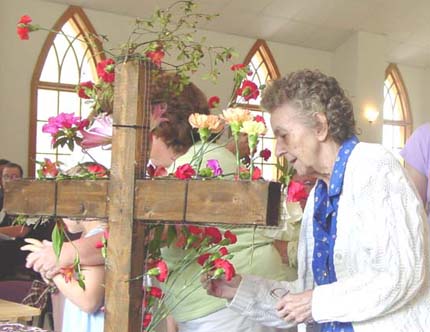
 Mrs. Hughes is pictured above adding flowers to the cross Easter 2005 in the sure and certain hope of the resurrection. Every day we hold a funeral or memorial service is Easter. The service today will be a joyous one and all are expected to wear bright clothing in keeping with the Easter nature of a Christian memorial service. While this may not be typical, it is appropriate and in keeping with the Hughes Family wishes.
Mrs. Hughes is pictured above adding flowers to the cross Easter 2005 in the sure and certain hope of the resurrection. Every day we hold a funeral or memorial service is Easter. The service today will be a joyous one and all are expected to wear bright clothing in keeping with the Easter nature of a Christian memorial service. While this may not be typical, it is appropriate and in keeping with the Hughes Family wishes.At 1/25/2007 5:20 PM, said…
The news of the death of Florence Hughes has reached us and we who knew her while she was a member of St. John's Church are very sad and want her husband Arthur and children Ian and Janice to know that their loss is our loss, too. Memories of Florence are an integral part of the fabric of our life in Christ. She brought her talents to serve in a leading role that is not an easy role to fill, Assistant Treasurer and Treasurer for years and there has been no one since willing to serve as long. This parish is located in a leading academic city with a very transient population so we are gaining and losing members regularly. But the Hughes family were the backbone of this church. The children grew up attending our church school and serving as acolytes while Arthur often offered support on projects. However it was Florence who would be in her pew every Sunday and who would come forward with willing hands when ever needed that marked her as a true Martha. By always being on time with her financial reports and attending countless vestry meetings she was our miracle worker who wore a cheerful face. .In addition she faithfully wrote long hand thank you notes to those who made gifts to the parish.
We were saddened when Florence and Arthur moved away, but understood their need to be near one of their children as they aged. The cruelty of Florence's illnesses gives us great sympathy for her and her family. We miss her spirit shining among us and know she will brighten the heavenly mansions we've been told will be waiting for us who trust in Our Saviour, Jesus Christ.
—St. John's Episcopal Church
New Haven
At 1/25/2007 5:43 PM, King of Peace said…
Today's sermon from Florence Hughes' Memorial Service is online here: A Body of England's.
At 1/25/2007 7:35 PM, said…

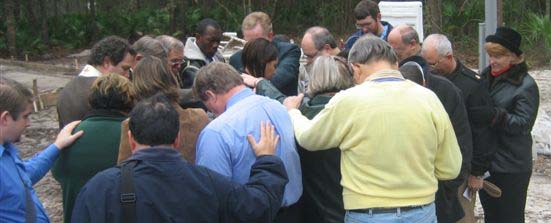

I had a great afternoon making new friends. Our church has started an Art Guild that meets a couple of Saturdays a month, and today was the day. We made cedar-filled sachets to sell at our Christmas bazaar later in the year. I like making things with my hands, but more important to me was spending a couple of hours with my daughter making new friends and getting to know other women in our church. Afterwards, some of us went to lunch together, too.
The writer of Hebrews said in Hebrews 10:24-25, "And let us consider one another in order to stir up love and good works, not forsaking the assembling of ourselves together, as is the manner of some, but exhorting one another, and so much the more as you see the Day approaching."
The full text of the post is here: Some Assembly Required. FYI: The Art Guild meets every other Saturday at 12 noon at the church to create crafts for sale in our Holiday Bazaar. The group is under the leadership of Deacon Jennifer Highsmith and its schedule is found in our newsletter and at the church website www.kingofpeace.org.
In the archives is the sermon Baptism and Community.
peace,
Frank+
The Rev. Frank Logue, Pastor
At 1/24/2007 7:19 AM, said…
At 1/25/2007 9:37 AM, said…
Glad you took a step towards being part of a community. Sometimes a newcomer may say that no one spoke to them, but they should also ask themselves if they stuck around after the service and tried speaking to someone new themselves. In a church where there are so many newcomers, it is hard for old timers to greet each new person. Sometimes the newcomer has to take some responsibility and take a leap of faith to meet people. Welcome! Let's pray more follow in your footsteps and take that leap.
Of course, the people he meets have learned not to trust soldiers and I imagine, if ordered to do so, the young man of the report will do things he will later regret. How many young men who were trying to find answers in life have been forced to do so while walking in hostile territory and carrying a gun?Their eyes look at me with distrust, and resignation. And I want to get out and tell them that I'm alright.
Then I look at myself, and see myself in uniform and I see what they see.
'Another soldier in uniform'
And I guess they are not wrong in feeling what they feel. And I feel very sad at the state of affairs. I want to tell them that I am about as good or as bad as any of them, and I am not here to harm them. Beneath the uniform I am just a young man in his twenties trying to find answers in life.
What I am saying is that I may be a soldier, but I am definitely not the enemy. In the end, there is still hope.
Walking around with a gun
I am reminded of the famed Christmas Truce of World War I in which both sides sang Christmas Carols and then met in the No Man's Land. There is still hope when we see the person who is supposed to be our enemy as a potential friend. But walking around with a gun in a war zone makes breaking down walls in that way impossible. Walk around with a gun long enough and someone will attack and then you will shoot back. It's what generations of idealistic young men with guns have had to do and will do again. That Christmas Truce was hopeful, but it was followed by more grueling trench warfare with each side laying waste to the other. By the time we are in trenches with guns cocked and loaded seeing one another as a potential friend is long gone from the equation.
That Christmas Truce was hopeful, but it was followed by more grueling trench warfare with each side laying waste to the other. By the time we are in trenches with guns cocked and loaded seeing one another as a potential friend is long gone from the equation.
Band of Brothers
I am a man. I don't tear up at sappy movies. In fact, I almost never cry at all. But I wept while wandering through the Congressional Medal of Honor citations exhibit at Parris Island Marine Recruiting Depot. I was not the only man crying, though we tried not to notice one another. I found the Marines' acts of bravery awe inspiring. Their courage under fire inspirational.
I know that the sort of bravery that is acknowledged with a Medal of Honor is not engendered by "the good of the nation" or the "honor of the fight" or anything less lofty than the love felt for the men a solider serves alongside. In the end, that is whom the soldier really fights for. Sure the country is a great idea and the flag is inspiring, but you fight hard for the men you fight with. It's about the Band of Brothers. And that too is honorable.
The Debt We Owe
Yet what we must acknowledge is that we owe so great debt to those who fight on our behalf, that we must think long and hard before deciding that the young men (and increasingly women) need to go war at all. Because we can teach them how to shoot a person. That's the easy part. But we have a tough time teaching them to live with it.
I hope that Indian soldier in Kashmir never has to learn that lesson. The full text of the BBC News article is online at Impressions from Kashmir War Zone.
At 1/23/2007 8:27 AM, said…
Frank,
I wonder if you ever think of yourself in some ways as the soldier does.
Your "uniform" can cause people to put up their shields and hide themselves from you. You (and all Christians) are soldiers of the Cross in a foreign land. We must represent Christ to people who mistrust us and our motives. Our sword is the Bible and that standard can be offputting (is that a word?) to people who haven't accepted Jesus.
May we never do anything that we will later regret, either.
At 1/23/2007 11:38 AM, King of Peace said…
Kenny,
That's a good image. I do know that my uniform of clericals breaks down a wall with some people and puts up on with others. What I find most interesting is it marks me so that people watch what they say around me and to me as if God will hear when I am there and won't hear when I am not.
There is also the image in theology of The Church Militant and the Church Triumphant with the church militant being the church on earth. That's where we get hymns like Onward Christian Soldiers who are not going to an actual military battle, but nonetheless go to war and march as if in to battle.
peace,
Frank+

Three old men,of whom one had a bad reputation, came one day to Abba Achilles.
The first asked him, "Father, make me a fishing-net."
"I will not make you one," he replied.
Then the second said, "Of your charity make one, so that we may have a souvenir of you in the monastery."
But he said, "I do not have time."
Then the third one, who had a bad reputation, said, "Make me a fishing-net, so that I may have something from your hands, Father."
Abba Achilles answered him at once, "For you, I will make one."
Then the two other old men asked him privately, "Why did you not want to do what we asked you, but you promised to do what he asked?"
The old man gave them this answer, "I told you I would not make one, and you were not disappointed, since you thought that I had no time. But if I had not made one for him, he would have said, 'The old man has heard about my sin, and that is why he does not want to make me anything,' and so our relationship would have broken down. But now I have cheered his soul, so that he will not be overcome with grief."
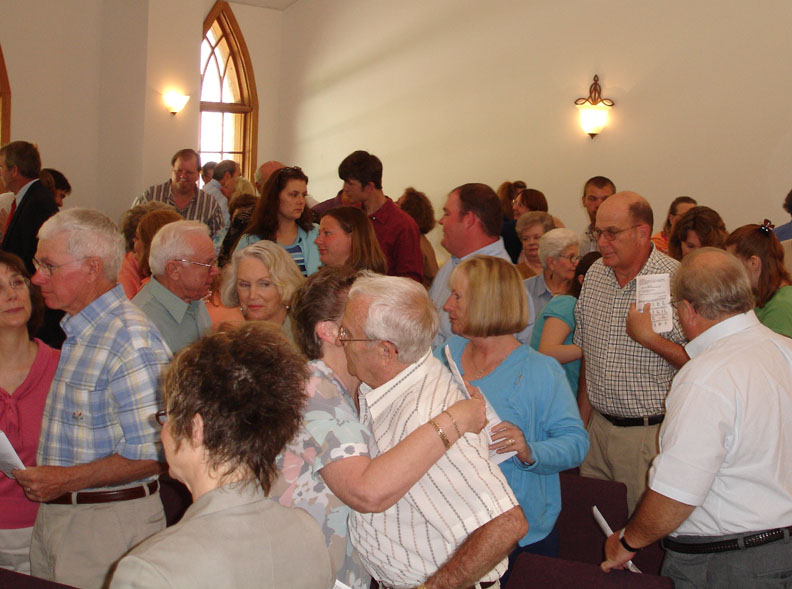 The congregation sharing The Peace at King of Peace
The congregation sharing The Peace at King of PeaceWe love each other as a result of his loving us first. If someone says, "I love God," but hates a Christian brother or sister, that person is a liar; for if we don't love people we can see, how can we love God, whom we have not seen? And God himself has commanded that we must love not only him but our Christian brothers and sisters, too.So the best way to experience that 101% of the Love of God is through loving your neighbor as yourself. That's the equation as I have learned it. What's been your experience of loving God through loving others?
At 1/26/2007 8:05 AM, said…
What holds people captive today? How might we continue to live into Jesus' goal to proclaim release to the captives?When the Emancipation Proclamation was issued in the midst of the Civil War, the slaves who lived within the realm of the Confederacy remained in bondage. Many did not know about the proclamation when it went into effect. Its authority was denied and nullified by local and regional power.
Yet Lincoln, in both his words and his claim to authority over the whole of the split and rebellious Union, contended that the proclamation was nonetheless true and real. And so this flawed and partial emancipation became the herald of a fuller freedom, a fulfillment yet unreached.
Jesus' proclamation...no different.
At 1/22/2007 8:45 AM, said…
While Lincoln's proclamation was a political document designed to garner support for his cause and, interestingly enough, only freeing the slaves within the bounds of the rebellious states, Jesus' proclamation was a spiritual one to all those enslaved by evil, regardless of their location.
Other than that, it's a good analogy. ;)
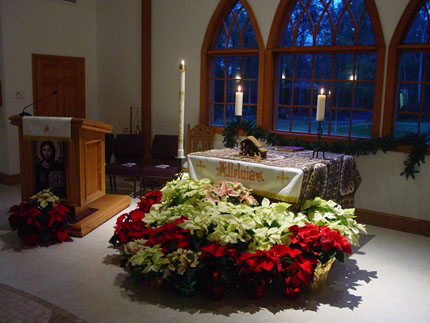
You scored as Sacrament model. Your model of the church is Sacrament. The church is the effective sign of the revelation that is the person of Jesus Christ. Christians are transformed by Christ and then become a beacon of Christ wherever they go. This model has a remarkable capacity for integrating other models of the church.
What is your model of the church? [Dulles] created with QuizFarm.com |
At 1/19/2007 1:35 PM, CS said…

Have you ever seen a heron standing motionless on the shore of a lake? From his attitude you might think he was standing gazing at God's Power and Glory, wondering at the great expanse of water, and at its power to cleanse and satisfy the thirst of living creatures. But the heron has no such thoughts in his head at all; he stands there hour after hour, simply in order to see whether he can catch a frog or a little fish.
Many human beings behave like that in prayer and meditation. They sit on the shore of God's Ocean; but they give no thought to His Power and Love, they pay no attention to His Spirit which , can cleanse them from their sins, neither do they consider His Being which can satisfy their soul's thirst; they give themselves up entirely to the thought of how they can gain something that will please them, something that will help them to enjoy the transitory pleasures of this world, and so they turn their faces away from the clear water of spiritual peace. They give themselves up to the things of this world which pass away, and they perish with them.Sometimes people ask me this question: "If God does not wish us to ask for material things, but for Himself, the Giver of all good, why does the Bible never say: Do not pray for this or that, pray simply for the Holy Spirit? Why has this never been clearly expressed?"
I reply, "Because He knew that people would never begin to pray if they could not ask for earthly things like riches and health and honours; He says to Himself: If they ask for such things the desire for something better will awaken in them, and finally they will only care about the higher things."
At 1/19/2007 9:56 AM, said…
You see birds like me, we stand and stare, not thinking we could see or be aware of the quiet and the peace. But let a small boy run at one of us, and watch us fly to a tree and wait, wait, for that boy to leave, so we can then fly back and stay in that same spot, enjoying the view, and now & then, spotting a fish or frog, eating our fill, yet also rejoicing that God made us as we are.
At 1/20/2007 4:11 PM, said…

My most formative religious experience came at the age of 25, sitting in the back of a small seminary auditorium in Portland, Oregon, listening to a gruff British speaker behind a small wooden podium.The full text of his article is online here: A profound revelation in a seminary auditorium.
The invited guest, Major Ian Thomas, was the founder and general director of Torchbearers, a Christian organization based in England. His thick British accent and staccato delivery made it a challenge to follow his message. But when he waved his partially amputated finger at the crowd he clearly got my attention.
His message that winter morning was on Moses and the burning bush. It was a story I was familiar with (probably most of us are) but his point was revolutionizing.
The essence of his talk was that it took Moses forty years in the wilderness to realize that he was nothing. It wasn’t until he came across a burning bush – a bush made mostly of worthless, dried-up old sticks, completely engulfed in flames yet not consumed – that Moses finally “got it.” And very quickly, as Major Thomas described the story, I did too.
According to Major Thomas, God was trying to tell Moses, “I don’t need a pretty bush or an educated bush or an eloquent bush. Any old bush will do, as long as I (God) am in the bush.”
Thomas went on to share, “If God is going to use you, he is going to use you. It will not be you doing something for him, but God doing something in you and through you.”
 Yesterday's sermon was a first in that it started as the blog entry Have a very active left prefontal lobe day. At that point, I knew the blog related to a reading for the coming Sunday, but thought I would preach on the Gospel of Jesus changing water to wine. I came to realize that I could easily preach the water to wine story, but that it sounded more like a history lesson and wasn't what I needed to preach. So, I revisited happiness. The sermon is online here: Discover Yourself. In it, I reference a Spiritual Gifts Survey, which I ran across when serving as a lay pastor at Church of the Spirit while in seminary. That survery is online here: Spiritual Gifts Survey in Adobe PDF format. I also mention Dr. Martin Seligman's similar Signature Strengths Survey which is found at his website: AuthenticHappiness.org. You have to register to take that survey, butit is free.
Yesterday's sermon was a first in that it started as the blog entry Have a very active left prefontal lobe day. At that point, I knew the blog related to a reading for the coming Sunday, but thought I would preach on the Gospel of Jesus changing water to wine. I came to realize that I could easily preach the water to wine story, but that it sounded more like a history lesson and wasn't what I needed to preach. So, I revisited happiness. The sermon is online here: Discover Yourself. In it, I reference a Spiritual Gifts Survey, which I ran across when serving as a lay pastor at Church of the Spirit while in seminary. That survery is online here: Spiritual Gifts Survey in Adobe PDF format. I also mention Dr. Martin Seligman's similar Signature Strengths Survey which is found at his website: AuthenticHappiness.org. You have to register to take that survey, butit is free.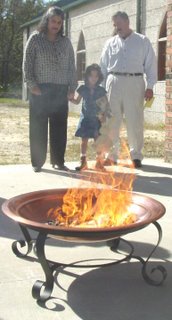 The photo at left shows financial pledges made to King of Peace burning unopened. Each year we ask those who consider King of Peace to be their church (whether memmbers yet or not) to write down a pledge for the coming year. They go in sealed envelopes and are brought forward at the offering. At the end of the service they are burned unopened. The pledges are between the person who made it and God.
The photo at left shows financial pledges made to King of Peace burning unopened. Each year we ask those who consider King of Peace to be their church (whether memmbers yet or not) to write down a pledge for the coming year. They go in sealed envelopes and are brought forward at the offering. At the end of the service they are burned unopened. The pledges are between the person who made it and God.At 1/14/2007 5:29 PM, CS said…

Once upon a time a certain teenage woman was invited to a birthday party. In fact according to all reports it was going to be a super cool party. However, this young woman was at that stage of her maturation where it was necessary to adopt a pose of infinite boredom with life, she was in fact like a flapper in one Evelyn Waugh’s novels about the nineteen twenties from the very act of breathing was an source of infinite fatigue. So she announced that she wasn’t going to the party because it would be “BORING!” Other young women considered her opinion, because she was one of the opinion-makers of her group, but they said well, maybe it won’t be boring. So they decided to attend the party. Our heroine’s mother kept urging her to give the party a chance because the birthday queen’s mother was such a nice woman. WELL, as we all know if a mother thinks something is worthwhile, by definition it can’t be. Anyway, at the last minute she decided to show up, if only to stop people from talking about her.I have to admit, now that you've read it, that the story leaves me wondering how it connects to the Gospel reading. I can see the party he describes and the girl's lack of participation and then the reversal in her description to her mom, but I can't make the connection.
She walked in the front door of the house, looked around at the thirty young people who were talking, dancing, and eating and said, Nobody’s here! Where’s everybody! So she found a segment of the wall that looked like it needed shoring up and leaned against, with a loud sigh. A nearby angel said she sighed a hundred and forty nine times during the party. Many of the boys at the party tried to talk to her. They offered to bring her food and a coke (the hostess’s mother kept an eagle eye out for other liquids) or a piece of cake. She just sighed again and shook her head. One boy, by reputation very cool, even brought her a piece of chocolate cake. Barf city she said.
When the party was over she walked home by herself. How was the party her mother asked. Oh, said young woman, it was great. Everyone was there and we had a wonderful time.
Jesus did enjoy life and wanted others to enjoy it to the fullest also. He is not a gloomy guide but a joyful friend. He tells us in fact, “This is who I am; follow me.” There is goodness in life and in the meaningful occasions of our lives.So is the Greeley story meant to show the opposite to the Gospel? What did I miss?

At 1/13/2007 7:45 AM, said…
At 1/13/2007 10:57 AM, anything but typical said…
At 1/13/2007 4:39 PM, CS said…
At 1/14/2007 11:19 PM, said…
I may be way off, but this is what I get out of it.
The girl was reluctant to attend the party but did so to be obediant to her mother. Her mother had faith in her. Also, because she wasn't mature, she wasn't comfortable being placed in a situation that could attract attention to her. The twist is this,....When Jesus changed water into wine it gave the Lord the opportunity to demonstrate his power and mission to all his extended family and close friends. ...The girl is the water, and the the other guests who reach out to her are demonstrating the Lords power and mission. This transforms her from water into wine....After some time spent refecting on the days events, she understands the transformation.
Robin Rapp
At 1/15/2007 8:29 AM, said…
At 1/15/2007 10:25 AM, said…
I suppose if I had a "most formative religious experience," it didn't actually take place in my lifetime, but occurred to a teenage boy 126 years ago. He was my great-grandfather, Gustav Niebuhr, after whom I'm named.He goes on to tell of how his great-grandfather's conversion to Christianity had ongoing implications for his family and writes of the elder Gustav's conversion saying,
About Gustav: He was strong-willed and adventurous, with something of a rowdy streak. At 18, he abruptly pulled up stakes from his native German village, found his way to a seaport and set sail for America. He got as far west as Illinois, where he shifted between agricultural and factory labor, eventually ending up working for his cousins, fellow immigrants who owned a farm.Those words did matter as they were a turning point for a whole family that would follow. Though he doesn't go into detail in the column, his family is one of famed theologians. His grandfather was H. Richard Niebuhr (1894–1962) whose book Christ and Culture was formative for me when I read it while serving as a pastor intern in Tanzania.They were pious folk and used to invite him to church. He typically refused.
But one day, he took them up. There's no record that's come down to me about what he heard that morning. But a sermon changed his life. Words do matter: I take that on faith.
I could quote Faulkner here, about the past not being past. But I think it's more to the point to say that experiences involving faith--which I consider deeply human experiences--can be exceptionally powerful. They can transcend space and time, and can even be felt for generations.peace,

 The Rev. Lonnie Lacey the Episcopal Chaplain at Georgia Southern who serves as Assistant Rector at Trinity Episcopal Church in Statesboro, Georgia has put together such an attractive and engaging website that The Episcopal Church couldn't help but brag about it at their home page. It's the website for Episcopal Campus Ministries at Georgia Southern. I would be proud anyway, but as an Alumni of GSU, I am particularly pleased to see the work Lonnie is putting in to connecting with college students there.
The Rev. Lonnie Lacey the Episcopal Chaplain at Georgia Southern who serves as Assistant Rector at Trinity Episcopal Church in Statesboro, Georgia has put together such an attractive and engaging website that The Episcopal Church couldn't help but brag about it at their home page. It's the website for Episcopal Campus Ministries at Georgia Southern. I would be proud anyway, but as an Alumni of GSU, I am particularly pleased to see the work Lonnie is putting in to connecting with college students there.

A plan to recruit and incorporate newcomers, clarity of mission and ministry, contemporary worship, involvement of children in worship, geographic location, a website and the absence of conflict are key factors in why some congregations in America are growing, according to the latest national survey of U.S. faith communities.Though he probably doesn't remember it, I've eaten a couple of meals with Kirk at the Presiding Bishop's Conference on Church Planting at which I was a presenter. He's a sharp guy and really has a handle on statistics about The Episcopal Church in a helpful way. Despite that King of Peace is not following his advice.The survey, sponsored by the Cooperative Congregational Studies Partnership (CCSP), found that wanting to grow is not enough. Congregations that grow must plan for growth.
"Congregations that developed a plan to recruit members in the last year were much more likely to grow than congregations that had not," according to a report on the survey written by C. Kirk Hadaway, Director of Research at the Episcopal Church Center in New York.
 The Mission Council (our church board) has talked about this more than once and we are clear that we don't want to do anything for the specific purpose of growing the church. We do want to be intentional about trying to be the Body of Christ in Camden County to the best of our ability.
The Mission Council (our church board) has talked about this more than once and we are clear that we don't want to do anything for the specific purpose of growing the church. We do want to be intentional about trying to be the Body of Christ in Camden County to the best of our ability. 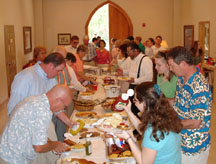 So we'll take the recent study as descriptive of us, but not prescriptive for what we should now do. Instead, we continue to call on parishioners to dream as God dreams and show us new ministries for which we have the gifts that should come to be a part of our ministry of reaching out to our community in love.
So we'll take the recent study as descriptive of us, but not prescriptive for what we should now do. Instead, we continue to call on parishioners to dream as God dreams and show us new ministries for which we have the gifts that should come to be a part of our ministry of reaching out to our community in love.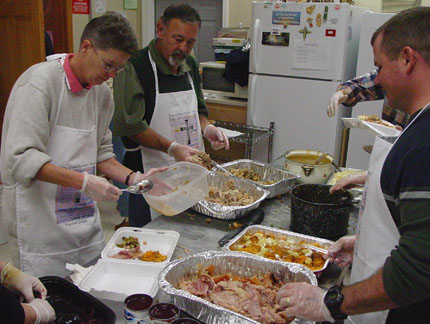
At 1/10/2007 1:17 PM, anything but typical said…
Jesus promised that if His disciples would lift Him up, He would draw all men unto Him.
Growing the Kingdom of God isn't about how many people you have on the membership list. It's about being the hands and feet of God to a world separated from Him. You can't measure God's progress by the 3 B's (Buildings, Budgets, and Baptisms) because I don't believe He keeps score that way.
Henry Blackaby, the author of the Experiencing God Bible study series, described it best. He said that God, at work in the world around us, invites us to join Him in what He is doing. God doesn't need us to make a plan; he just wants us to follow.
Our attitude should be, "Here am I, Lord, Speak for your servant hears" not "Over here, Lord, see what I'm doing for you."
Debbie
At 1/10/2007 1:57 PM, King of Peace said…
Kirk Hadaway (referenced above) wrote a reply to my email letting him know of the blog entry and graciously has allowed me to reprint it here:
I usually talk about growth as a by-product of congregational vitality, rather than an end in itself.
This report deals with correlates of growth, and we simply found that a plan for growth was related to growth, but not as much as actually doing things to invite and incorporate new people. More than likely, the correlation is based on the fact that congregations that care about reaching the people in their community are more likely to do something, whereas those who don't care tend to do nothing (and decline).
Kirk
 Kashdan notes "published studies that optimistic people live longer and that certain regions of the brains of positive people show more activity (“Have a very active left prefrontal lobe day,” he joked at one point)." The article goes on to note the popularity of such classes around the country, such as at Harvard where, with 855 students, the class is the most popular at that esteemed university.
Kashdan notes "published studies that optimistic people live longer and that certain regions of the brains of positive people show more activity (“Have a very active left prefrontal lobe day,” he joked at one point)." The article goes on to note the popularity of such classes around the country, such as at Harvard where, with 855 students, the class is the most popular at that esteemed university.Students were asked to do something that they were good at, be it writing, playing basketball or talking to their friends. According to positive psychology, your signature strengths play a special role in building your confidence and thus bringing you happiness.You are asked to identify your special strengths and then use those strengths to try something new.
Positive psychology brings the same attention to positive emotions (happiness, pleasure, well-being) that clinical psychology has always paid to the negative ones (depression, anger, resentment). Psychoanalysis once promised to turn acute human misery into ordinary suffering; positive psychology promises to take mild human pleasure and turn it into a profound state of well-being.Wondering how you rate? Dr. Martin Seligman of Pennsylvania is a leading researcher who offers some questionaires at authentichappiness.org to help people assess themselves online.
 OK. I know this is closer to the Gospel According to Oprah than to Matthew, Mark, Luke and John, but finding meaning in life through using your God-given talents to reach out to others sounds pretty solidly Christian to me, even if the way it is presented is more Oprahesque than usual. In fact, Harvard psychology professor Daniel Gilbert, says, “I guess I just wish it didn’t look so much like a religion.”
OK. I know this is closer to the Gospel According to Oprah than to Matthew, Mark, Luke and John, but finding meaning in life through using your God-given talents to reach out to others sounds pretty solidly Christian to me, even if the way it is presented is more Oprahesque than usual. In fact, Harvard psychology professor Daniel Gilbert, says, “I guess I just wish it didn’t look so much like a religion.”At 1/10/2007 6:19 AM, said…
KingofPeace : I received a MA basically in Positive Psychology just over one year ago. I am quite interested in SIGNATURE STRENGTHS. taking that 240 question survey 3 times about 6 mos apart, I felt my top 5 were 'really me.' I wish to pursue talking to groups about Sig.Strens. [SS] as I view not living by one's SS a bit like trying to comb hair which grow to the left - comb to the right .... and it won't remain that way without superglue spray ! it also goes to a question which has been used in past for mid-age persons who feel dissatisfied with their jobs or life: what did you enjoy doing as a child? as our SS are mostly inborn, these are evident usu. in childhood. do you agree ?
barb in central MD
At 1/10/2007 7:06 AM, said…

We thank you, Father, for the water of baptism. In it we are buried with Christ in his death. By it we share in his resurrection. Through it we are reborn by the Holy Spirit. Therefore in joyful obedience to your Son, we bring into his fellowship those who come to him in faith, baptizing them in the Name of the Father, and of the Son, and of the Holy Spirit.
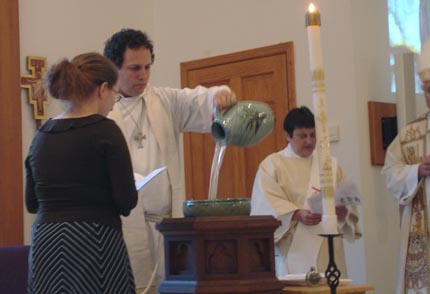
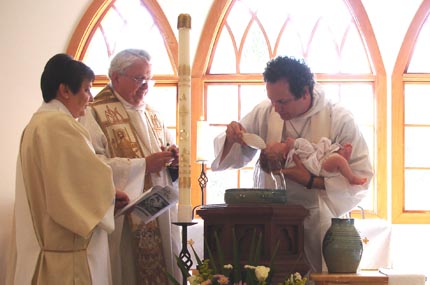
At 1/08/2007 9:22 PM, CS said…
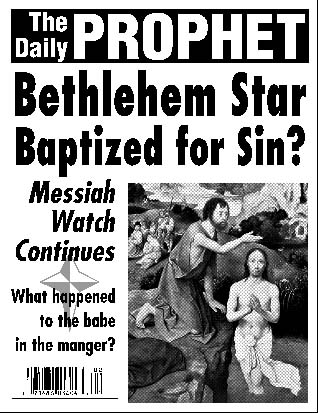
Why was God pleased? What was Jesus doing in that water anyway? Jesus went to the river for the forgiveness of Sin. Just as a newborn infant, who has surely not sinned, is baptized for forgiveness of Sin, so too was Jesus baptized. Not because of sins, the many little sinful actions of our lives in which we turn ourselves away from God, but because of Sin. Sin is the main root cause of all the other sins....The full text of the sermon is online here: Bethlehem Star Baptized for Sin
Being born into this world turned from God, meant that Jesus should one day make a decisive break from that Sin. The moment for this came at the start of his earthly ministry. Jesus entered the water and was baptized as an outward sign of the inward action of God lovingly washing away the effects of Sin, the sinful state of a world turned from God. Even the Sinless One knew that he must wash away the Sin of a world turned away from God in order to more fully receive the gift of the Holy Spirit. Then with the full anointing of the Holy Spirit, Jesus was ready to begin his ministry.
We too live in a world turned from God. People are created good, in the image of God, made for a life lived connected with God and with each other. Yet we live in a world which is fundamentally disconnected. People are disconnected from God, from each other, and from nature. Human life is no longer what it was created to be. But it’s never too late. Each of us can make a fundamental turn away from a world lived apart from God toward a world lived in connection to God and through that we connect more fully with each other....
Through baptism, we make the story of Jesus our own story. We do as Jesus did. In obedience to God we pray for the stain of a world turned from God to be washed away. The Holy Spirit comes to give us the grace and strength to live out this new life.
 Tonight at 5 p.m., Bishop Louttit will be on hand as we will welcome Mary Newsum into Christ's body, the church, through baptism. Then we'll have the Burning of the Greens with Low Country Boil and Oyster Roast at 6 p.m. And tomorrow the Bishop will still be with us as Maxwell Goodwin is baptized. These services will offer all of us a chance to reaffirm the commitments made in our baptisms.
Tonight at 5 p.m., Bishop Louttit will be on hand as we will welcome Mary Newsum into Christ's body, the church, through baptism. Then we'll have the Burning of the Greens with Low Country Boil and Oyster Roast at 6 p.m. And tomorrow the Bishop will still be with us as Maxwell Goodwin is baptized. These services will offer all of us a chance to reaffirm the commitments made in our baptisms.At 1/06/2007 10:20 AM, said…
At 1/08/2007 4:49 AM, said…
It has never occurred to me to question Jesus being baptized. If we are to be Christ-like and baptism is important to God, then of course Jesus would set the example and be baptized. I think it emphasizes the importance of baptism and fully illustrates how God will be fully present in it and give all of us the indwelling of His Holy Spirit.

 The article Man is rescued by stranger on subway tracks is the best anecdotal argument I have that one does have free will. A mish-mash of subconscious, evolutionary fueled-instinct and the illusion of choice don't quite explain actions against one's own best self-interest or the interest of furthering your own line in the evolutionary chain. It seems more likely that a variety of factors had formed the subway hero so that his subconscious jumped to save another even as his conscious mind caught up to the danger. But both parts of his mind were involved and in agreement.
The article Man is rescued by stranger on subway tracks is the best anecdotal argument I have that one does have free will. A mish-mash of subconscious, evolutionary fueled-instinct and the illusion of choice don't quite explain actions against one's own best self-interest or the interest of furthering your own line in the evolutionary chain. It seems more likely that a variety of factors had formed the subway hero so that his subconscious jumped to save another even as his conscious mind caught up to the danger. But both parts of his mind were involved and in agreement.At 1/06/2007 6:13 AM, Linda McCloud+ said…
At 1/06/2007 8:45 AM, anything but typical said…
A seminary professor gave me some wise advice. He said the best course of action is to take the Gospel and run with it - spread it far and wide. If Calvinism is true, you won't convert anyone who isn't predestined, and if Armenianism is true, then we've been unquestioningly obedient to the Great Commission and participated in a great work of God.
Debbie

A bevy of experiments in recent years suggest that the conscious mind is like a monkey riding a tiger of subconscious decisions and actions in progress, frantically making up stories about being in control.The article quotes Michael Silberstein, a science philosopher at Elizabethtown College in Pennsylvania as saying,
If people freak at evolution, etc. how much more will they freak if scientists and philosophers tell them they are nothing more than sophisticated meat machines, and is that conclusion now clearly warranted or is it premature?The article goes on to say,
How comforted or depressed this makes you might depend on what you mean by free will. The traditional definition is called “libertarian” or “deep” free will. It holds that humans are free moral agents whose actions are not predetermined. This school of thought says in effect that the whole chain of cause and effect in the history of the universe stops dead in its tracks as you ponder the dessert menu.The problem started in the 1970s when Benjamin Libet, a physiologist at the University of California, San Francisco, wired up the brains of volunteers to an electroencephalogram and told the volunteers to make random motions, like pressing a button or flicking a finger, while he noted the time on a clock. The article says,
At that point, anything is possible. Whatever choice you make is unforced and could have been otherwise, but it is not random. You are responsible for any damage to your pocketbook and your arteries.
The article looks at Free Will from other angles and largely sees it as a "convenient illusion" and takes the perspective that "According to deep mathematical principles, they say, even machines can become too complicated to predict their own behavior and would labor under the delusion of free will."Dr. Libet found that brain signals associated with these actions occurred half a second before the subject was conscious of deciding to make them. The order of brain activities seemed to be perception of motion, and then decision, rather than the other way around.
In short, the conscious brain was only playing catch-up to what the unconscious brain was already doing. The decision to act was an illusion, the monkey making up a story about what the tiger had already done.
There are no shortcuts in computation. That means that the more reasonably you try to act, the more unpredictable you are, at least to yourself. Even if your wife knows you will order the chile rellenos, you have to live your life to find out.If you are intrigued, you'll want to look at the full text of the article: Free Will: Now you have it now you don't which does a better job explaining itself than my digest above.
At 1/04/2007 9:08 AM, said…
At 1/05/2007 8:09 AM, said…
"These guys are getting paid to be fertilizer salesmen."
Yeah. What he said.
It does seem amazing to me that these people who are paid to be so smart are arguing against their means of livelihood. Either that or they really do believe they are a different species from the rest of us who never actually had an original thought.
Ayn Rand set up her antagonists with philosophies remarkably similar to these in "Atlas Shrugged". She pretty effectively destroyed them as well.
At 1/05/2007 8:51 AM, King of Peace said…
At 1/05/2007 9:11 AM, said…
It all goes back to your definition of free will and intelligence. If you start with the idea that we're all animals then you wind up with the idea that there's no such thing as choice (makes me wonder what the pro-choice abortionists would say but that's another argument.)
If we really do have choice then we have to act like it and be accountable for our actions to God and each other. If not, then pretty much my whole religious philosophy comes crashing down. And if we don't, then can we really determine whether we do one way or the other?
I don't think so, so we'd just as well act as if we do.
Ultimately, the answer is probably that human intellect is far more complex than we've been giving it credit for being. We've spent so much time on scans of the brain we think we've got it all figured out from a mechanical perspective. I also think God's got a few more surprises in store for us.

0 Comments:
Post a Comment
<< Home